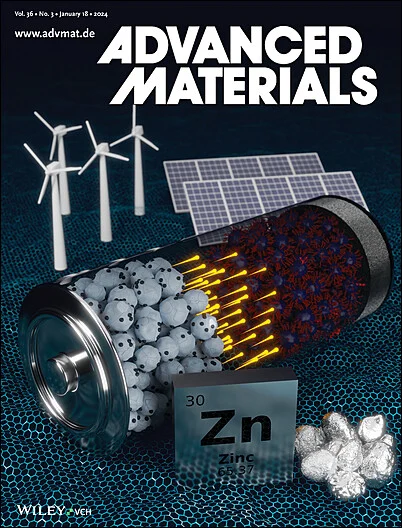Albumin‐Chaperoned Deep‐NIR Triarylmethane Dyes for High‐Contrast In Vivo Imaging and Photothermal Therapy
IF 27.4
1区 材料科学
Q1 CHEMISTRY, MULTIDISCIPLINARY
引用次数: 0
Abstract
Fluorophores absorbing/emitting in the deep near‐infrared (deep NIR) spectral region, that is, 800 nm and beyond, hold great promise for in vivo bioimaging, diagnosis, and phototherapy due to deeper tissue penetration. The bottleneck is the lack of bright, stable, and readily synthesized deep NIR fluorophores. Here, it is reported that the albumin‐chaperon strategy is a viable one‐for‐all strategy to address these difficulties. A focused library of deep‐NIR absorbing dyes (EA5) is easily synthesized via a two‐step cascade. They are neither very stable nor bright in phosphate buffer due to a propeller‐type flexible scaffold. Through screening, EA5_c3 is found to exhibit a high affinity toward bovine serum albumin (BSA). Binding‐associated structural rigidification resulted in a gigantic 26‐fold fluorescence enhancement. The albumin chaperone also greatly improved the stability of EA5_c3 by shielding the bisbenzannulated triarylmethane core from nucleophilic or oxidative species. The resulting EA5_c3@BSA exhibits high biocompatibility. It offered high‐resolution vasculature, lymph systems, tumors, and other tissue imaging with its bright deep NIR emission. At the same time, it exhibits prominent potential in photoacoustic imaging and photothermal treatment of subcutaneous and orthotopic breast tumors. These findings provide insights into robust and high‐performance fluorophores with deep NIR regions for theranostic against aggressive cancers.

用于高对比度体内成像和光热疗法的白蛋白陪衬型深近红外三芳基甲烷染料
在深近红外光谱区(即 800 纳米及以上)吸收/发射的荧光团具有更深的组织穿透力,因此在体内生物成像、诊断和光疗方面大有可为。目前的瓶颈是缺乏明亮、稳定、易于合成的深近红外荧光团。据报道,白蛋白-伴侣策略是解决这些困难的可行的一举多得的策略。通过两步级联法,一个集中的深近红外吸收染料库(EA5)很容易合成。由于采用了螺旋桨式柔性支架,它们在磷酸盐缓冲液中既不十分稳定,也不明亮。通过筛选,发现 EA5_c3 对牛血清白蛋白(BSA)具有很高的亲和力。结合后的结构僵化使荧光增强了 26 倍。白蛋白伴侣还通过保护双苯甲烷化三芳基甲烷核心免受亲核或氧化物的影响,大大提高了 EA5_c3 的稳定性。由此产生的 EA5_c3@BSA 具有很高的生物相容性。它具有明亮的深近红外发射,可提供高分辨率的血管、淋巴系统、肿瘤和其他组织成像。同时,它在光声成像和皮下及原位乳腺肿瘤的光热治疗方面也具有突出的潜力。这些发现为利用深近红外区的强健、高性能荧光团治疗侵袭性癌症提供了启示。
本文章由计算机程序翻译,如有差异,请以英文原文为准。
求助全文
约1分钟内获得全文
求助全文
来源期刊

Advanced Materials
工程技术-材料科学:综合
CiteScore
43.00
自引率
4.10%
发文量
2182
审稿时长
2 months
期刊介绍:
Advanced Materials, one of the world's most prestigious journals and the foundation of the Advanced portfolio, is the home of choice for best-in-class materials science for more than 30 years. Following this fast-growing and interdisciplinary field, we are considering and publishing the most important discoveries on any and all materials from materials scientists, chemists, physicists, engineers as well as health and life scientists and bringing you the latest results and trends in modern materials-related research every week.
 求助内容:
求助内容: 应助结果提醒方式:
应助结果提醒方式:


